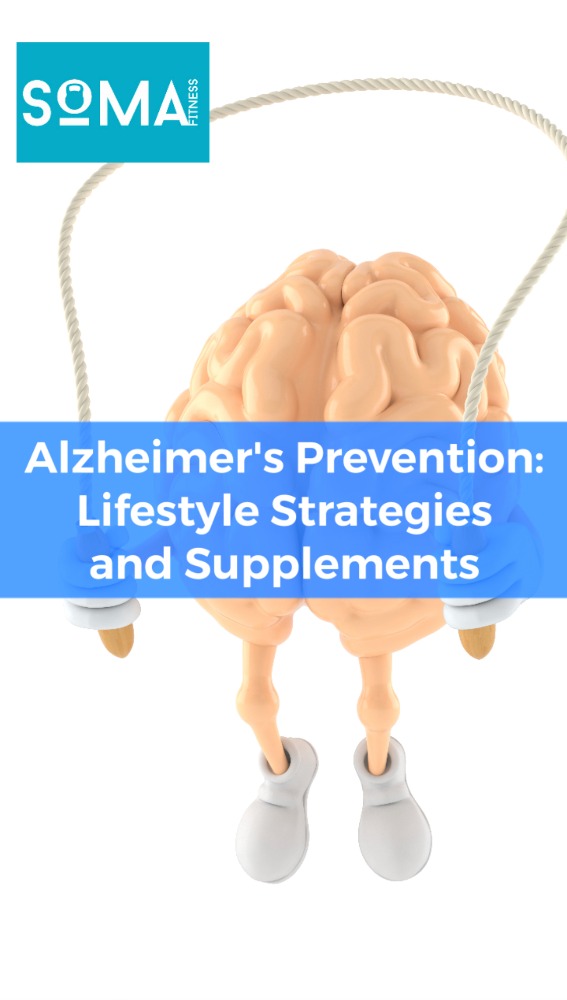Alzheimer’s Prevention: Lifestyle Strategies and Supplements
After speaking to a number of our personal training clients regarding Alzheimer’s disease and the effects it can have on families and loved ones we reached out and had an opportunity to speak with a health professional who has outlined some key points that can easily be added to your supplement and lifestyle routines that can aid with prevention, as we all know prevention is the most powerful cure.
Alzheimer’s disease is a debilitating neurodegenerative condition that affects millions of people worldwide. While there is currently no known cure prevention is our best strategy, research suggests that certain lifestyle modifications and the use of specific supplements may help in reducing the risk and delaying the onset of Alzheimer’s. In this article, with the guidance of our health professional Madalina who owns the Natural Roots in Hale, Altrincham we will outline a comprehensive plan for Alzheimer’s prevention, incorporating various strategies and supplements backed by scientific evidence.
Supplements:
Alpha Lipoic Acid is a powerful antioxidant that has been studied for its potential benefits in Alzheimer’s prevention. ALA crosses the blood-brain barrier, providing protection against oxidative stress and inflammation, both of which play a role in neurodegenerative diseases. Research indicates that ALA may enhance cognitive function and memory, as well as improve glucose metabolism in the brain, which is crucial for brain health.
Omega-3 fatty acids, particularly docosahexaenoic acid (DHA) and eicosapentaenoic acid (EPA), are essential for brain health. These fatty acids are found abundantly in fatty fish, such as salmon and mackerel. Omega-3s have been associated with a reduced risk of cognitive decline and Alzheimer’s disease. They help promote brain cell communication, reduce inflammation, and support overall brain function.
Lion’s Mane Mushroom is a medicinal fungus known for its potential cognitive benefits. It contains bioactive compounds that can stimulate the production of nerve growth factors, which play a vital role in brain cell regeneration and maintenance. Studies suggest that Lion’s Mane Mushroom may enhance cognitive function, improve memory, and protect against neurodegenerative diseases, including Alzheimer’s.
Lifestyle Strategies:
Heavy Metal Detox:
A heavy metal detox should be conducted under the guidance of a professional to ensure safety and efficacy. Heavy metals like lead and mercury can contribute to cognitive decline and neurodegenerative disorders. Detoxification protocols involve chelating agents and supportive measures to eliminate these toxins from the body.
Low Sugar Diet with Healthy Fats:
Adopting a low sugar diet, particularly in the style of the Mediterranean diet, can provide multiple benefits for brain health. The Mediterranean diet emphasises fresh fruits, vegetables, whole grains, quality proteins (animal, fish, legumes) and healthy fats such as avocados, olive oil and nuts. This diet is rich in antioxidants, anti-inflammatory compounds, and essential nutrients that support brain function and reduce the risk of Alzheimer’s disease.
Regular Physical Exercise:
Engaging in regular physical exercise has been shown to have a positive impact on brain health. Exercise promotes blood flow to the brain, enhances neuroplasticity, and reduces the risk of cognitive decline. Studies suggest that both aerobic exercise and strength training can improve cognitive function, memory, and overall brain health.
Cognitive Stimulation:
Keeping the brain active and engaged through cognitive stimulation is crucial for Alzheimer’s prevention. Activities such as reading, puzzles, chess, backgammon, learning a new skill or language, and social interactions can help maintain cognitive function and strengthen neural connections. Additionally, computer-based app brain training programs, like those offered by Lumosity or BrainHQ, have shown promise in improving cognitive abilities.
Stress Management:
Chronic stress can have detrimental effects on brain health and increase the risk of cognitive decline. Stress management techniques, such as deep breathing exercises, meditation, massage, yoga, and mindfulness, can help reduce stress levels and promote overall well-being. These practices have been shown to improve cognitive function and protect against neurodegenerative diseases.
Sleep Optimisation:
Adequate sleep is essential for brain health and cognitive function. Optimising sleep includes adopting healthy sleep habits such as wearing an eye mask, avoiding screens before bed, using blue light-blocking glasses, ensuring a dark sleeping environment with blackout blinds, maintaining a consistent bedtime routine, and practicing relaxation techniques like breathing exercises before bed. Aim for 7-8 hours of quality sleep each night to support optimal brain function.
Clean Up Your Cosmetics:
One way to ensure that your cosmetics are free from potentially harmful chemicals and heavy metals is to opt for more natural products. By choosing cosmetics made with natural and organic ingredients, you can minimise your exposure to potentially harmful substances. Some cosmetics are applied to the head face and armpits which are then absorbed into the body control Aluminium compounds and other toxic metals and parabens which may compound over time and cause damage to your brain cells. To make informed decisions about the products you use, you can download the Think Dirty app. This app provides a scoring system that evaluates the potential toxicity of various cosmetics and personal care products. By scanning the barcode or searching for a specific product, you can quickly access its score and detailed information about the ingredients. This empowers consumers to make choices that align with their preferences for cleaner and safer cosmetics. By taking these steps, you can take control of your beauty routine and prioritise products that are free from potentially harmful chemicals and heavy metals.
While Alzheimer’s disease remains a complex condition with no known cure, adopting a comprehensive approach to prevention can significantly reduce the risk and delay the onset of symptoms. By incorporating the supplements and lifestyle strategies outlined in this article, individuals can proactively support brain health and potentially mitigate the development of Alzheimer’s disease. Lets hope that one day medical science can find a cure for this disease, till then preventative strategies are our only hope.
I hope you found this helpful and many thanks to Madalina from the Natural Roots for helping us put this article together.


Leave a Comment
(0 Comments)